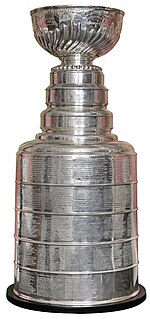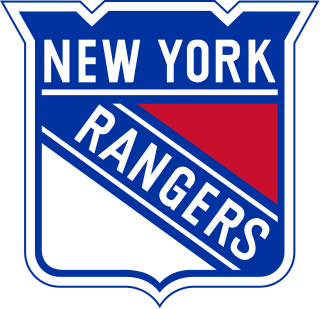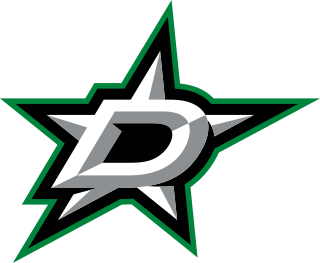In ice hockey, the Stanley Cup Final (also known as the Stanley Cup Finals among various media [nb 1] ) is the championship series of the National Hockey League (NHL) to determine the winner of the Stanley Cup. The series is played in a best of seven format, meaning that a team must win four games in order to win the series and the Cup. Games that are tied at the end of regulation time go to overtime. In the history of the NHL, there have been 17 series which have ended on a game-winning goal in overtime.

Ice hockey is a contact team sport played on ice, usually in a rink, in which two teams of skaters use their sticks to shoot a vulcanized rubber puck into their opponent's net to score points. The sport is known to be fast-paced and physical, with teams usually consisting of six players each: one goaltender, and five players who skate up and down the ice trying to take the puck and score a goal against the opposing team.

The National Hockey League is a professional ice hockey league in North America, currently comprising 31 teams: 24 in the United States and 7 in Canada. The NHL is considered to be the premier professional ice hockey league in the world, and one of the major professional sports leagues in the United States and Canada. The Stanley Cup, the oldest professional sports trophy in North America, is awarded annually to the league playoff champion at the end of each season.

The Stanley Cup is the championship trophy awarded annually to the National Hockey League (NHL) playoff winner. It is the oldest existing trophy to be awarded to a professional sports franchise, and the International Ice Hockey Federation (IIHF) considers it to be one of the "most important championships available to the sport". The trophy was commissioned in 1892 as the Dominion Hockey Challenge Cup and is named after Lord Stanley of Preston, the Governor General of Canada who donated it as an award to Canada's top-ranking amateur ice hockey club. The entire Stanley family supported the sport, the sons and daughters all playing and promoting the game. The first Cup was awarded in 1893 to Montreal Hockey Club, and winners from 1893 to 1914 were determined by challenge games and league play. Professional teams first became eligible to challenge for the Stanley Cup in 1906. In 1915, professional ice hockey organizations National Hockey Association (NHA) and the Pacific Coast Hockey Association (PCHA) reached a gentlemen's agreement in which their respective champions would face each other annually for the Stanley Cup. It was established as the de facto championship trophy of the NHL in 1926 and then the de jure NHL championship prize in 1947.
Contents
The first overtime Cup winning goal was scored by Bill Cook of the New York Rangers in game four of the 1933 final against goaltender Lorne Chabot and the Toronto Maple Leafs. Mush March of the Chicago Black Hawks repeated the feat in 1934 against Wilf Cude and the Detroit Red Wings, also in game four. The 1933 and 1934 series were played in a best of five format; the current best of seven format was adopted beginning in 1939.

William Osser Xavier Cook was a Canadian professional ice hockey right winger who played for the Saskatoon Crescents of the Western Canada Hockey League (WCHL) and the New York Rangers of the National Hockey League (NHL). A prolific scorer, Cook led the WCHL in goals twice and the NHL three times. He was named an all-star seven times between the two leagues. Known as "The Original Ranger", Cook was the first captain of the New York Rangers, scored the first goal in franchise history and led the team to two Stanley Cup championships.

The New York Rangers are a professional ice hockey team based in New York City. They are members of the Metropolitan Division of the Eastern Conference of the National Hockey League (NHL). The team plays its home games at Madison Square Garden in the borough of Manhattan, an arena they share with the New York Knicks of the National Basketball Association (NBA). They are one of three NHL teams located in the New York metropolitan area; the others being the New Jersey Devils and New York Islanders.
The 1933 Stanley Cup Finals was played between the New York Rangers and the Toronto Maple Leafs, in a rematch of the 1932 Final. It was the first best-of-four Finals series. The Rangers won the series 3–1 to win their second Stanley Cup.
Pete Babando in 1950 and Tony Leswick in 1954, both with the Red Wings, scored the only game seven Cup winning goals. Babando scored against Chuck Rayner and the Rangers while Leswick scored against Gerry McNeil and the Montreal Canadiens. The goal in 1954 was the second overtime Cup winner allowed by McNeil, the only goaltender to have allowed more than one, the first having been scored in 1951 by Bill Barilko of the Maple Leafs.

Peter Joseph Babando is a former National Hockey League player who skated for the Boston Bruins, Detroit Red Wings, Chicago Black Hawks, and New York Rangers. During six NHL seasons, Babando scored 86 goals, 73 assists in 351 regular season games. However, Babando's mark in history was made on April 23, 1950 in Game seven of the Stanley Cup Finals. As a member of the Red Wings, he scored a sudden death to eliminate the Rangers at 8:31 of the second overtime. As of 2018, it remains the only Stanley Cup Final game seven to go multiple overtimes. At the time he was one of the few American-born players in the NHL. The goal was the third and final Stanley Cup playoff goal in Babando's career. He was born in Braeburn-Lower Burrell, Pennsylvania and raised in South Porcupine, Ontario.
The 1950 Stanley Cup Finals was contested by the New York Rangers and the Detroit Red Wings. It was the Rangers' first appearance in the Final since their Stanley Cup victory in 1940. The Red Wings would win the series 4–3 to mark their franchise's fourth Cup win, and first since 1943.

Anthony Joseph Leswick was a Canadian ice hockey forward who played mostly for the New York Rangers and Detroit Red Wings of the NHL. Nicknamed "Tough Tony" and "Mighty Mouse", he was known also as a little pest. Little, because he stood just 5'7" tall and weighed 160 lbs. He is most famous for scoring the final goal in overtime of game seven of the 1954 Stanley Cup final.
Twice in Stanley Cup history has a team won the Cup on an overtime series winner one season, and then lost the same way the next season. The Canadiens won the 1953 series in overtime, only to lose it the following year to Detroit. The Dallas Stars won the 1999 Stanley Cup vs the Buffalo Sabres, only to lose it the following year to the New Jersey Devils.
The 1953 Stanley Cup Finals was contested by the Boston Bruins and the Montreal Canadiens. The Bruins were appearing in the Final for the first time since 1946. The Canadiens, who were appearing in their third straight Final series, won the series four games to one, matching their previous Cup-winning performance.

The Dallas Stars are a professional ice hockey team based in Dallas. They are members of the Central Division of the Western Conference of the National Hockey League (NHL). The team was founded during the 1967 NHL expansion as the Minnesota North Stars, based in Bloomington, Minnesota. Before the beginning of the 1978–79 NHL season, the team merged with the Cleveland Barons after the league granted them permission due to each team's respective financial struggles. Ultimately, the franchise relocated to Dallas for the 1993–94 NHL season. The Stars played out of Reunion Arena from their relocation until 2001, when the team moved less than 1.5 miles into the American Airlines Center.

The 1999 Stanley Cup Finals was the championship series of the National Hockey League's (NHL) 1998–99 season, and the culmination of the 1999 Stanley Cup playoffs. It was contested by the Eastern Conference champion Buffalo Sabres and the Western Conference champion Dallas Stars. It was the 106th year of the Stanley Cup being contested. The Sabres were led by captain Michael Peca, coach Lindy Ruff and goalie Dominik Hasek. The Stars were led by captain Derian Hatcher, coach Ken Hitchcock and goalie Ed Belfour. It was the Sabres' second Stanley Cup Final appearance, the first being a loss to Philadelphia in 1975. It was the third appearance for the Stars' franchise, and their first since moving to Dallas from Minnesota in 1993. Minnesota lost in the Final to the NY Islanders in 1981 and to Pittsburgh in 1991. The Stars defeated the Sabres four games to two to win their first Stanley Cup, becoming the eighth post-1967 expansion team to earn a championship, and the first Southern team to win the Cup. This was the first time since 1994 that the Stanley Cup Finals did not end in a sweep. This series is also remembered because of the controversial finish to game six, in which Stars forward Brett Hull scored the Cup-winning goal with his skate in the crease, which was against the rules at the time. The league allowed the goal to stand as it was ruled that Hull was turned into the crease while maintaining continuous possession. 1999 was the only year between 1995 and 2003 that neither the New Jersey Devils, the Colorado Avalanche nor the Detroit Red Wings won the Stanley Cup.



